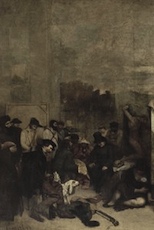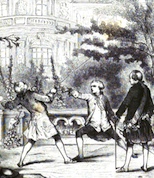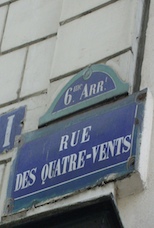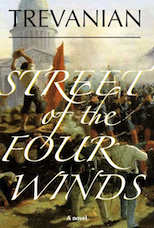
|
|
| TREVANIAN.COM
has a new
look. We will gradually be replacing
material and adding new stuff in the coming weeks. If you want to go back in time, you can still view the old-style web site here Back to the Home page Join the SOTFW Facebook group here Trevanian on Facebook Download Chapter 1 Internet Edition |
"In our so very civilized society it is necessary for me to live the life of a savage. I must be free even of governments. The people have my sympathies, I must address myself to them directly." - Gustav Courbet
The Paris revolution of 1848 reverberated around Europe and the world. Young men and women, workers, merchants and artists, rose up together against the forces of rampant capitalism, self-interested politicians and uncontrolled colonial exploitation, to flower briefly in Paris as a revolutionary government demanding civil liberties and a means to improve the lot of the poor and the down-trodden. |
Trevanian writes: "I called the book The Street of the Four Winds, after the ancient street in the 6th Arrondisement where the action was centered, and where I lived (in a garret, appropriately enough) through the research period. It was my big canvas, large-cast, Nineteenth Century novel in which the Reader met every level of society, art, and commerce by following the multi-charactered hero/heroine I was confecting of the principal characters, one representing the artistic battle, one the search for love, another the need to care for your oppressed brothers, another dealing with problems (and advantages) of coming from a minority culture, another facing the particular problems of the woman artist in the early 19th century, etc. etc. The novel finally brought all the lines of action and all the characters to a climactic denouement on the barricades of the great insurrection of 1848." |
| Themes of liberty and justice
run through all the Trevanian books. Even writing about spies and
assassins, he always made his political points. For example, in Shibumi. Towards the end, with everything he loved destroyed, Hel, no ruthless killer, was still prepared to leave his persecutor, Diamond, to his fate. But then, '...Hel stopped. He remembered that Diamond was a servant of the Mother company, a corporate lackey. Hel thought of offshore rigs contaminating the sea, of strip-mining over virgin land, of oil pipelines through tundra, of atomic energy plants built over the protests of those who would ultimately suffer contamination. He recalled the adage: Who must do the hard things? He who can. With a deep sigh, and with disgust in souring the back of his throat, he turned and raised his arm...' Trevanian was against speculators and giving favours to the rich. He was democratic by experience and instinct. 'Taxes are how we take care of ourselves', he would say. |
A familiar story to us even
today. Trevanian's
epic tale skillfully weaves the stories of youth, of art and love
contesting the misery and economic slavery born out of the
revolution of capital and trade sweeping the world.  Something of M. Garnier's
Academy here
Showing a mastery
of story-telling techniques and in complete control of the difficult
form, in Street of the
Four Winds, Trevanian
concerns himself with the struggle for recognition, the need for
friendship and love, and the pain of failure and loss - themes familiar
to those readers of Hugo, Balzac and the rest - but Trevanian's heroes
and heroines also confront such modern enemies as monopolistic
corruption, institutionalized poverty, endemic injustice and the
beginnings of what we now call 'The System'. A formal a way to kill Count d'Orsini  Street of the Four Winds is a Parisian street on the South Bank |
A document from the actual Revolution. After their initial success against the government forces in the Tuileries, on 24 February 1848, the 'Mob' issued the following proclamation. In the name of the French people: A reactionary and oligarchical government has just been overthrown by the heroism of the people of Paris. That government has fled, leaving behind it a trail of blood that forbids it ever to retrace its steps. The blood of the people has flowed as in July; but this time this noble people shall not be deceived. It has won a national and popular government in accord with the rights, the progress, and the will of this great and generous nation. A provisional government, the result of pressing necessity and ratified by the voice of the people and of the deputies of the departments, in the session of February 24, is for the moment invested with the task of assuring and organizing the national victory. It is composed of Messieurs Dupont (de l'Eure), Lamartine, Cremieux, Arago (of the Institute), Ledru-Rollin, Garnier-Pages, Marie, Armand Marrast, Louis Blanc, Ferdinand Flocon, and Albert (a workingman). These citizens have not hesitated a moment to accept the patriotic commission which is imposed upon them by the pressure of necessity. With the capital of France on fire, the justification for the present provisional government must be sought in the public safety. All France will understand this and will lend it the support of its patriotism. Under [Page 560] the popular government which the provisional government proclaims, every citizen is a magistrate. Frenchmen, it is for you to give to the world the example which Paris has given to France; prepare yourselves by order and by confidence in your destiny for the firm institutions which you are about to be called upon to establish. The provisional government wishes to establish a republic,--subject, however, to ratification by the people, who shall be immediately consulted. The unity of the nation (formed henceforth of all the classes of citizens who compose it); the government of the nation by itself; liberty, equality, and fraternity, for fundamental principles, and "the people" for our emblem and watchword: these constitute the democratic government which France owes to itself, and which our efforts shall secure for it. |
| ©2011Gravity Publishing |
